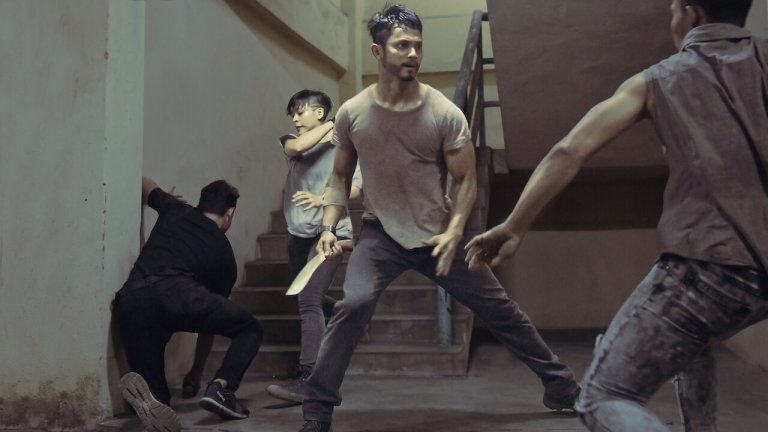Wira Review: Meet the Next Martial Arts Movie Star
Malaysia cinema brings a new martial hero to Netflix with Hairul Azreen in Wira.

The hottest fight scenes are coming out of Southeast Asia right now. And fresh off the boat is the Malaysian actioner Wira, now available on Netflix and starring a bright young martial star named Hairul Azreen. The Southeastern charge into martial arts movies began in 2011 with the Indonesian breakout film, The Raid: Redemption. The sequel, The Raid 2, picked up the action right where the first film left off and a new vision for ultraviolence was born. Fight choregraphy turned visceral, merciless, and totally awesome.
The Raid films introduced the world to fight scene game-changers Iko Uwais and Yayan Ruhian, who rose to such cult status in stunt person circles that they scored superfluous cameos in Star Wars: The Force Awakens.
Now Malaysia, which is just across the ocean from the Indonesian islands, is picking up the martial mantle with its own keen take on cinema. Wira tapped Ruhian as the villain to oppose the new kid Azreen, but it’s not like the newbie establishing himself by besting a fading predecessor as imagined in Once Upon a Time … In Hollywood. Ruhian is still at the top of his game and he also sits in the most critical chair for a martial arts movie here: the Fight Choreographer.
Ruhian, like Uwais, is a genuine master of the Southeast Asian martial art of Silat. Silat is an umbrella term for a large and diverse collection of combat disciplines practiced across Brunei, Indonesia, Malaysia, the Philippines, Singapore, Thailand, and Vietnam. Through their influence, the ferocity of Silat brought a brand-new take on action with extreme and gritty battles, one that has been echoing across Hollywood cinema lately. It ratchets up the bar for viciousness and sanguine splatter, and Ruhian brings this to Wira in full force.
As martial arts movie stars go, Hairul Azreen is one to watch. Azreen has previously starred in a string of burgeoning Malaysian actioners. Unlike Ruhian, Azreen is not a Silat master. He holds a black belt in Taekwondo. Strapping and dashing, Azreen has an impossibly long neck and stands taller than most of his castmates and stuntmen. It presents a challenge to his fight scenes. His enemies become smaller, less menacing. In order to compensate for his physical dominance, Wira adds sheer numbers, pitting Azreen against big gangs of baseball bat and machete wielding foes in outrageous one-versus-dozens melees.
In Wira, Azreen plays Hassan, a former commando returned to pull his father and sister out of the ghetto. Hassan’s old hood is ruled by the evil kingpin Raja (Dain Iskandar Said), a slumlord, MMA promoter, meth maker, and oppressive boss of the condom factory that runs the ghetto. Half of the time, Raja speaks English instead of Malay, adding to his villainy. The film opens with a brutal caricature of a women’s MMA fight between Raja’s daughter Vee (Ismi Melinda) and Hassan’s sister Zain (Fify Azmi) setting up a female rivalry that runs the course of the film. Hassan enters like Rambo in First Blood, a returning soldier walking into town who gets stopped by police, but there’s a twist. The rest of the film is genre cliché—Hassan’s family is bound by an old debt to Raja. To pay it off, Hassan and Zain are forced back into the MMA ring, and the fights just keep escalating from there.
However, this is a martial arts film, so the plot comes secondary to the action and it is Hassan’s fight scenes that garner the spotlight. He bursts into action with a thrilling long take fight against a horde of gangsters. Within the martial genre, a long take fight scene has been held in the highest regard since the golden era of the old school Shaw Brothers Studios Kung Fu movies back in the ‘70s. Fight choreography is a dangerous dance where a misstep can easily end in an actor’s broken jaw. The more movements that a continuously shot fight can pull off is a testament to the action star’s skill as well as the stunt people, the choreographers, and the cinematographers. Hassan’s first fight scene is a convoluted warehouse fight that runs almost a minute and a half. While that’s no 1917, the complicated composition of the scene is outstanding, a showcase of what Azreen can deliver.
Beyond that warehouse fight, the novel use of long-take drone shots is inspired. One visionary fight scene breaks out of the window of a cramped bus alongside a tossed body, circles the moving bus peering in at the fight within, then re-enters through another window broken by a gunshot. Although not a fight scene, there’s another long-take drone shot that starts as the gang crashes the gate of the slumlord’s tenement housing at street level. The camera soars up over the building to look down through the courtyard upon the perpetrators as they climb up the staircases, and then pans upward on the balcony where their target awaits. It’s a flash of Malaysian style on how to move a camera.
The climax of any martial arts film is in the final fight. And here, Wira does not disappoint with a face-off between the film’s two biggest badasses for the main event: Azreen versus Ruhian. Ruhian plays Raja’s top heavy, Ifrit. With few lines, Ruhian seethes with menace. Azreen is much taller than Ruhian, but Ruhian makes up for his lack of reach with his precision and timing. Many of the earlier gang fights had wide swings and hesitations that came off staged. However, that was somewhat forgivable. The gang members weren’t meant to be as skilled as Hassan, and it’s easy to spoil any one-on-dozens fight scene by watching the background stunt people queue up for their butt kicking. This makes Ruhian shine even more. His actions are so tight and fast that there’s little room for error. When he dominates Azreen, and Azmi too, he sells those punches with panache. Ruhian’s Silat is pure pugilistic poetry in motion.
Wira is directed by Adrian Teh, one of Malaysia’s top directors with award-winning films like The Hungry Ghost Ritual and Southeast Asian box office successes like King of Mahjong. His rom-com time-travel parody, Goodbye Mr. Loser, was an enormous sleeper hit in Mainland China that even garnered a limited North American theatrical release and earned $228 million worldwide.
Wira is the second collaboration between Teh and Azreen. Azreen played Arman, the leading man for Teh’s militaristic Paskal. Just like China’s two blockbuster Wolf Warrior films had the support of China’s People Liberation Army, Paskal was backed by the Royal Malaysian Navy. No matter what country, official support of the armed forces converts films into propagandist gun shows, macho displays of military might, and nationalistic heroes, as well as recruitment ads. This isn’t to say such films lack spectacle. The fire fights are as explosive as they get. No need for CGI when there’s real missiles to shoot. Although the bulk of the action is gunplay and firefights, there’s a ferocious finale fight between Arman and the traitorous Jeb (Ammar Alfian), an actor who is bigger and burlier than Azreen. It’s a decent piece of fight choreography, made more interesting by its vertiginous setting on an oil rig platform.
Paskal was only released in theaters locally. Nevertheless, it earned 30 million Malaysian Ringgits ($7 million dollars), making it a major blockbuster by Malaysian standards. Netflix also picked up Paskal last year. Although Azreen plays a completely different character in Paskal, the film exists in the same universe as Wira, and the concluding tease for a potential sequel which would merge the storylines.
Teh had both Azreen and Azmi commit to three months of training prior to Wira. Azreen put in additional daily sessions with Ruhian, sharpening his fight chops with the master. During filming, Azreen tore a ligament in his right leg but he shook it off, claiming that Wira was the action film he had been dreaming of making for a long time. Wira means ‘hero’ in Malay, and Azreen is already a hero to his country. With the right opportunities, he could be a new martial hero for the world.
Wira is now available globally on Netflix. Subtitles are limited to English and Malay.

